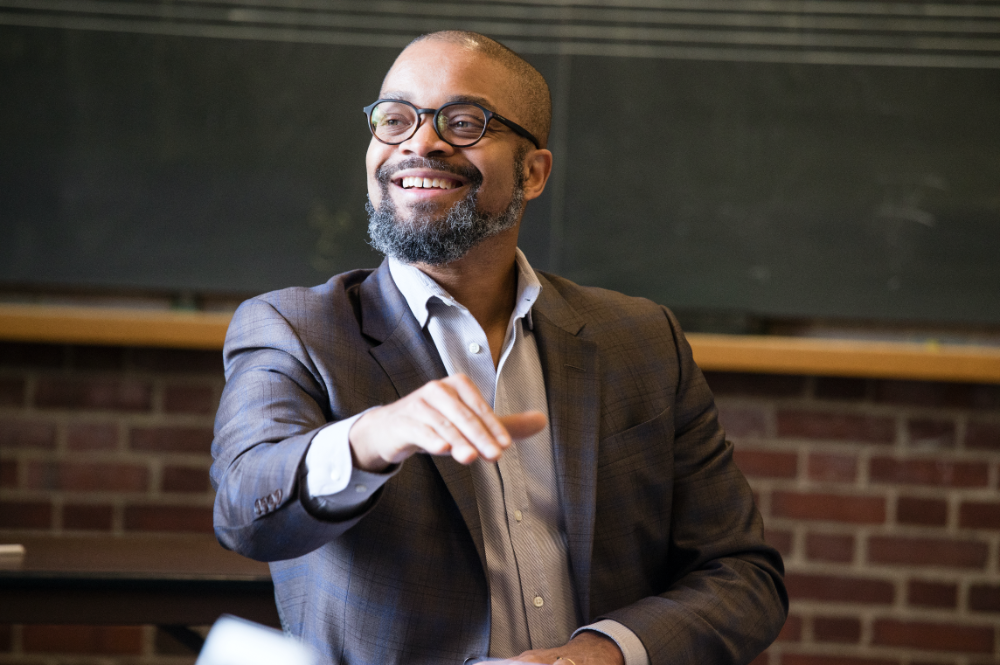
When Darryl Harper ’90 was a first-year, he explored math, anthropology, astronomy. Then he dug into psychology. “I knew that music was going to be part of my life no matter what,” he says. “So I thought: Let me see what else is going on at the College that I might like.”
That impulse to dig in, to examine a topic from all angles, has stayed with Harper. A jazz clarinetist and composer, he returned to Amherst as an associate professor of music in 2017, and became a regular at the Wednesday afternoon salons at the Center for Humanistic Inquiry. He liked how the CHI—founded in 2015—assembles professors from across departments. “You can’t understand a big, complicated question from just one disciplinary perspective,” he says. “The collaboration of disciplines makes a decisive difference in the way that we understand.”
Harper went from CHI regular to CHI director, succeeding founding director Martha Umphrey, the Bertrand H. Snell 1894 Professor in American Government, in 2019. The CHI—on the second floor of Frost Library—organizes performances, exhibitions, salons and more, all around a two-year theme. The theme for 2019–20 and 2020–21 is “Home.” The center also hosts humanities scholars as full-time CHI Fellows who conduct research on the theme and participate in weekly, collaborative salons.
Some claim the humanities are dying. He counters: the same was said about jazz.
Harper traces his interest in collaborations to his senior year at Amherst, when he undertook an interdisciplinary, performance-based thesis exploring the rules of three musical traditions: South Indian Carnatic music, European classical music and American jazz. The experience of going to a concert is not unlike the experience of a CHI salon, says Harper. “There’s a physiological exchange of sound traveling back and forth,” he notes, but also something more: “You know that, when you leave, you’ll be changed.”
As CHI director, Harper is eager to do more with Amherst’s membership in the New England Humanities Consortium, which Umphrey co-founded. “The NEHC gives Amherst College all these opportunities for collaboration with other member schools,” says Harper, who believes that local and global humanities networks help establish humanities research as “a public good.”
Umphrey describes the CHI as “well-planted” now. “Darryl brings a warm and welcoming sensibility to the work,” she says. “He has the brilliance and imaginative reach to tend its many projects well and to point the CHI in new and exciting directions.”
On returning to Amherst after nearly 30 years away
“I was stunned by how the College had changed, particularly in its social justice commitments and its explicit commitments to diversity and inclusion. It was apparent not just in the way the student body looks, but in the kinds of ideas that they are concerned with. I’ve taught jazz history for 20 years or more, and I’m hearing ideas come up in classes that I haven’t heard before. It’s a real pleasure as a teacher to be in that position—where students are providing momentum. I’m very excited to be at the College again at this moment in its history.”
On claims that the humanities are dying
“The same thing happened in jazz. There was all this talk about how ‘jazz is dead, jazz is dying.’ I think it’s incumbent upon an institution like Amherst to disrupt that narrative and present a model of how the humanities are functioning well. I want us to show how our humanities work is significant, not only for the scholars who are doing it, but for others, too.”
On STEM professors at CHI events
“We’re called the Center for Humanistic Inquiry, not the Center for the Humanities Disciplines. You can have humanistic inquiry in almost any context. That’s always been a very important part of the identity of this center—that is, it’s open and it’s welcoming. And if you have ideas about humanistic inquiry, it doesn’t matter if you’re faculty or staff. It doesn’t matter if you’re a scientist, a social scientist, an artist—all of those things are included in our vision of what humanistic inquiry can be.”
Photo by Maria Stenzel